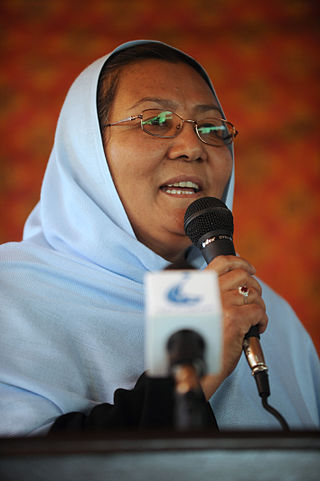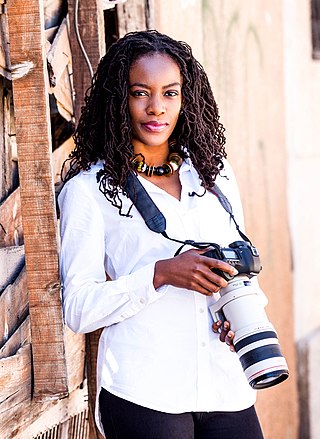Related Research Articles

Dr. Habiba Sarābi is a hematologist, politician, and reformer of the reconstruction of Afghanistan after the Taliban first took power. In 2005, she was appointed as Governor of Bamyan Province - the first Afghan woman to become a provincial governor. She had served as Afghanistan's Minister of Women's Affairs and as Minister of Culture and Education. Sarabi was instrumental in promoting women's rights and representation and environmental issues. She belongs to the ethnic Hazara people of Afghanistan. Her last name is sometimes spelled Sarobi.

Goodluck Ebele Azikiwe Jonathan is a Nigerian politician who served as the president of Nigeria from 2010 to 2015. He lost the 2015 presidential election to former military head of state General Muhammadu Buhari and was the first incumbent president in Nigerian history to concede defeat in an election and therefore allow for a peaceful transition of power.

Christina Lamb OBE is a British journalist and author. She is the chief foreign correspondent of The Sunday Times.
Mellissa Fung is a Canadian journalist with CBC News, appearing regularly as a field correspondent on The National.
Ofeibea Quist-Arcton is a Ghanaian-British radio journalist, correspondent, commentator and broadcaster. She works for National Public Radio, reporting on issues and events related to West Africa. She grew up in Ghana, Italy, Britain, and Kenya.
Adam Ferguson is an Australian freelance photographer who lives in New York City. His commissioned work has appeared in New York, Time, Vanity Fair, The New York Times Magazine, The New York Times, The New Yorker, Wired, and National Geographic, among others. Ferguson's work focuses on conflict and on civilians caught amidst geopolitical forces. His portraits of various head's of state have appeared on numerous Time covers.
Yvonne Ndege is an international journalist, and media and communications professional. She started her career at the British Broadcasting Corporation, as a graduate trainee in London, United Kingdom.
Kate Brooks is an American photojournalist who has covered the Middle East, Afghanistan, and Pakistan since September 11, 2001.

Enenche Akogwu, was a Nigerian journalist and cameraman for Channels Television. In January 2012, he was shot and killed in Kano, Nigeria while investigating a Boko Haram bombing by an unidentified gunman. His work mainly focused on human rights, politics, and war. He covered news stories across the northern region of Nigeria.

Jodi Bieber is a South African photographer. Her photograph of Bibi Aisha, a woman from Afghanistan whose ears and nose were severed by her husband and brother-in-law, was selected as the World Press Photo of the Year in 2010.
Religious violence in Nigeria refers to Christian-Muslim strife in modern Nigeria, which can be traced back to 1953. Today, religious violence in Nigeria is dominated by the Boko Haram insurgency, which aims to establish an Islamic state in Nigeria. Since the turn of the 21st century, 62,000 Nigerian Christians have been killed by the terrorist group Boko Haram, Fulani herdsmen and other groups. The killings have been referred to as a silent genocide.

Chikaodinaka Sandra Oduah is a Nigerian-American journalist who has worked as a television news producer, correspondent, writer and photographer. She is currently a correspondent for VICE News. Known for her unique human-focused ethnographic reporting style with an anthropological approach, she was awarded a CNN Multichoice African Journalist Award in 2016. Upon the abduction of 276 schoolgirls by the terrorist group Boko Haram in Chibok, northeastern Nigeria, she was the first international journalist to visit and spend extensive time in the remote community of Chibok. Her thorough and exclusive coverage of the mass kidnapping won her the Trust Women "Journalist of The Year Award" from the Thomson Reuters Foundation in 2014. Oduah's reporting explores culture, history, conflict, human rights, and development to capture the complexities, hopes and everyday realities of Africans and people of African descent.

Salomé Karwah was a Liberian nurse who was named co-Person of the Year by Time magazine in 2014 for her efforts to combat the West African Ebola virus epidemic. She appeared on the cover of Time in December 2014 with other health care workers and colleagues working to end the epidemic. Karwah survived ebola herself, before returning to work with Médecins Sans Frontières to help other patients afflicted with the disease. The actions of Karwah and other health care professionals are believed to have saved lives of thousands. However, two years later, Karwah died from complications of childbirth; her widower suggested that this might have been due to the widespread, mistaken belief that ebola survivors can still transmit the virus. Even before the ebola outbreak, Liberia had one of the highest rates of maternal mortality in the world.
Mohammed Elshamy is an Egyptian photojournalist based in Lagos and New York.
Trudie Lang is a Professor of Global Health Research at the University of Oxford. She specialises in clinical trials research capacity building in low-resource setting, and helped to organise the trial for the drug brincidofovir during the 2014 Ebola virus outbreak.
Eromo Egbejule is a Nigerian journalist, writer and filmmaker. He is known mostly for his work on the Boko Haram insurgency and other conflicts in West and Central Africa. He is currently Africa Editor at Al Jazeera English.
Helen Branswell is a Canadian infectious diseases and global health reporter at Stat News. Branswell spent fifteen years as a medical reporter at The Canadian Press, where she led coverage of the Ebola, Zika, SARS and swine flu pandemics. She joined Stat News at its founding 2015, leading the website's coverage of the ongoing COVID-19 pandemic.
Natalie E. Dean is an American biostatistician specializing in infectious disease epidemiology. Dean is currently an assistant professor of Biostatistics at the University of Florida. Her research involves epidemiological modeling of outbreaks, including Ebola, Zika and COVID-19.
Zahra Joya is an Afghan journalist. She is the founder of Rukhshana Media, an outlet in Persian and English which she runs from exile.

Adeola Akinremi is a Nigerian journalist, columnist, policy advisor and International development professional who currently serves as a consultant for the World Bank Group. He served as a U.S correspondent, editor and columnist at This Day newspaper. Akinremi is well known for his courage in journalism. On 16 September 2016, he broke a plagiarism story, in which Nigeria’s former President Muhammadu Buhari copied from President Barack Obama and passing it off as if it was his own.
References
- ↑ "Aryn Baker | LinkedIn". za.linkedin.com. Retrieved 2016-05-02.[ permanent dead link ]
- 1 2 3 4 5 6 "Aryn Baker". Time Media Kit. Retrieved 2016-05-02.
- ↑ "Aryn Baker". za.linkedin.com. Retrieved 2016-04-14.[ permanent dead link ]
- 1 2 "Baker, Aryn — International Reporting Project". internationalreportingproject.org. Retrieved 2016-04-14.
- ↑ "Aryn Baker | LinkedIn". za.linkedin.com. Retrieved 2016-04-14.[ permanent dead link ]
- ↑ Baker, Aryn. "Does Nigeria Have What It Takes to Defeat Boko Haram?". Time . Retrieved 2016-05-02.
- ↑ Baker, Aryn. "Corruption in Military Defense Spending Could Be Behind Rise in Africa Terror Attacks". Time. Retrieved 2016-05-02.
- ↑ Baker, Aryn (2010-08-09). "Afghan Women and the Return of the Taliban". Time. ISSN 0040-781X . Retrieved 2016-05-02.
- ↑ Baker, Aryn. "Zika Hasn't Hurt Africa—and That May Be the Key to Beating It". Time. Retrieved 2016-05-02.
- ↑ "SAJA | South Asian Journalists Association - Past Award Winners". www.saja.org. Archived from the original on 2018-10-12. Retrieved 2016-05-02.
- ↑ "Aryn Baker, Time Magazine's Afghanistan Reporter, Failed To Disclose Conflict Of Interest: NY Observer [Update]". The Huffington Post . 12 August 2010. Retrieved 2016-04-14.